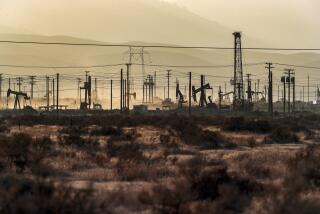Energetic competition
CALIFORNIA BADLY NEEDS NEW energy sources, such as imported natural gas, but we donŌĆÖt need to foul our air or endanger coastal residents to get it. Unfortunately, federal regulators seem in a rush to do both, even as better alternatives appear at their doorstep.
The latest entry in the stateŌĆÖs power sweepstakes is a subsidiary of Woodside Energy, based in Perth, Australia. WoodsideŌĆÖs subsidiary announced Wednesday a proposal for what it says is a cleaner, safer way of delivering liquefied natural gas to California than building an offshore or onshore terminal.
The two proposed LNG terminals that are the furthest along in the approval process would bring economic benefits, but they both have problems. The one proposed by a partnership of Mitsubishi and ConocoPhillips at the port in Long Beach raises serious safety questions; an accident or terrorist attack could endanger people in surrounding communities. A floating terminal 14 miles off the coast of Oxnard, proposed by BHP Billiton, is safer, but its potential to damage the environment is worrisome.
Gov. Arnold Schwarzenegger favors the BHP project, and the Bush administration has it on the fast track. Judging from the actions of the Environmental Protection Agency, that push will include ignoring county clean-air rules and threatening the health of residents of Ventura and Los Angeles counties.
After sending BHP a letter in April 2004 saying the oil giant would have to comply with Ventura County clean-air regulations for major new pollution sources, the EPA reversed itself in June. The new letter to BHP said the EPA would apply the same standards to the floating port as it would to a project built on the Channel Islands, where such county regulations do not apply. Not only does that contradict the legal arguments laid out by EPA officials in their 2004 letter, it violates common sense. The proposed terminal is closer to Oxnard than it is to the nearest of the Channel Islands. Airborne toxins wouldnŌĆÖt just drift to Oxnard, they could blow to Santa Monica or Santa Barbara, or anywhere in between.
The Long Beach and Oxnard proposals are still well worth considering. In Long Beach, weŌĆÖd like to see more convincing evidence that the facility is safe. In Oxnard, the project makes sense only if it is required to comply with state and local clean-air rules.
Woodside Energy hasnŌĆÖt revealed enough about its project -- involving tankers that would turn the fuel back into gas aboard ship, then send it through an offshore pipeline -- for it to be deemed superior to the others. But its proposal shows that there may be better alternatives out there. California should carefully assess all of them before regulators approve something that may endanger the stateŌĆÖs residents.
More to Read
Sign up for Essential California
The most important California stories and recommendations in your inbox every morning.
You may occasionally receive promotional content from the Los Angeles Times.










